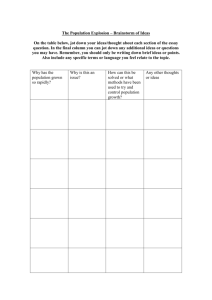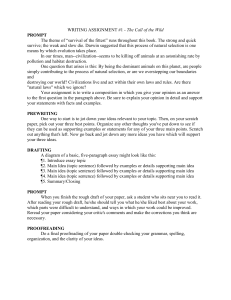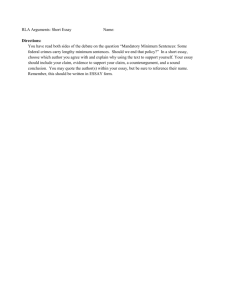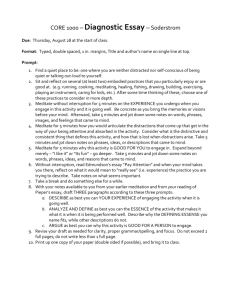how to write an essay
advertisement
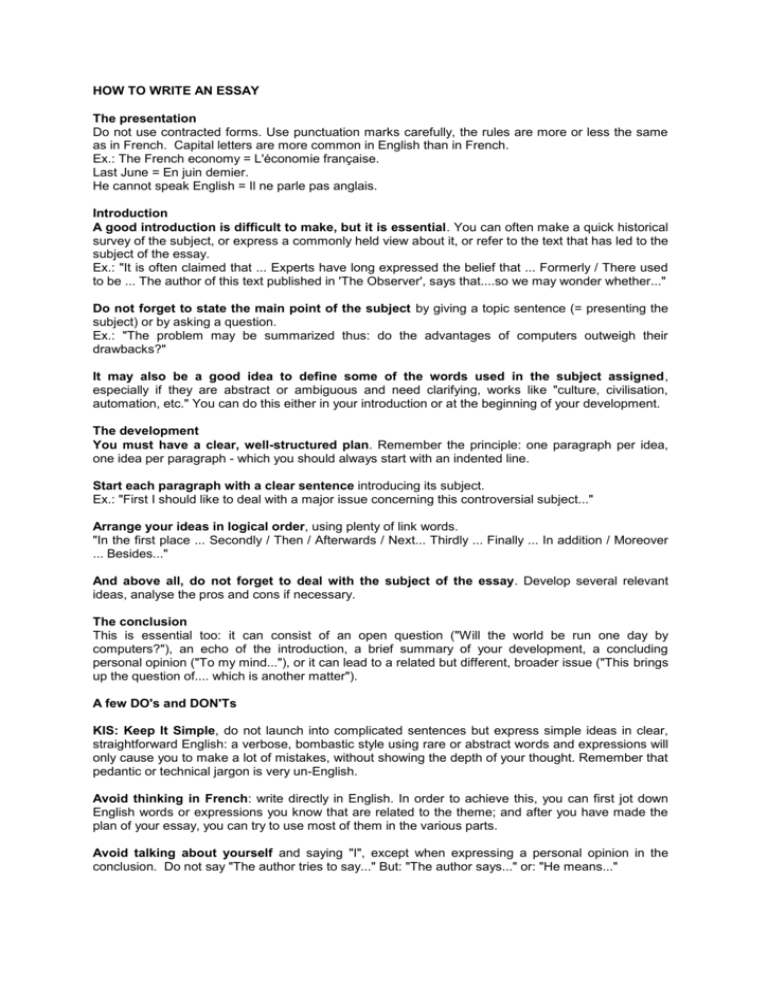
HOW TO WRITE AN ESSAY The presentation Do not use contracted forms. Use punctuation marks carefully, the rules are more or less the same as in French. Capital letters are more common in English than in French. Ex.: The French economy = L'économie française. Last June = En juin demier. He cannot speak English = Il ne parle pas anglais. Introduction A good introduction is difficult to make, but it is essential. You can often make a quick historical survey of the subject, or express a commonly held view about it, or refer to the text that has led to the subject of the essay. Ex.: "It is often claimed that ... Experts have long expressed the belief that ... Formerly / There used to be ... The author of this text published in 'The Observer', says that....so we may wonder whether..." Do not forget to state the main point of the subject by giving a topic sentence (= presenting the subject) or by asking a question. Ex.: "The problem may be summarized thus: do the advantages of computers outweigh their drawbacks?" It may also be a good idea to define some of the words used in the subject assigned, especially if they are abstract or ambiguous and need clarifying, works like "culture, civilisation, automation, etc." You can do this either in your introduction or at the beginning of your development. The development You must have a clear, well-structured plan. Remember the principle: one paragraph per idea, one idea per paragraph - which you should always start with an indented line. Start each paragraph with a clear sentence introducing its subject. Ex.: "First I should like to deal with a major issue concerning this controversial subject..." Arrange your ideas in logical order, using plenty of link words. "In the first place ... Secondly / Then / Afterwards / Next... Thirdly ... Finally ... In addition / Moreover ... Besides..." And above all, do not forget to deal with the subject of the essay. Develop several relevant ideas, analyse the pros and cons if necessary. The conclusion This is essential too: it can consist of an open question ("Will the world be run one day by computers?"), an echo of the introduction, a brief summary of your development, a concluding personal opinion ("To my mind..."), or it can lead to a related but different, broader issue ("This brings up the question of.... which is another matter"). A few DO's and DON'Ts KIS: Keep It Simple, do not launch into complicated sentences but express simple ideas in clear, straightforward English: a verbose, bombastic style using rare or abstract words and expressions will only cause you to make a lot of mistakes, without showing the depth of your thought. Remember that pedantic or technical jargon is very un-English. Avoid thinking in French: write directly in English. In order to achieve this, you can first jot down English words or expressions you know that are related to the theme; and after you have made the plan of your essay, you can try to use most of them in the various parts. Avoid talking about yourself and saying "I", except when expressing a personal opinion in the conclusion. Do not say "The author tries to say..." But: "The author says..." or: "He means..." Try to be broad-minded, to weigh the advantages and drawbacks of any stand. Do not be prejudiced, nor hold biased views. Do not make racist or sexist statements. Avoid clichés and stereotypes, unless it is to combat them. Try to keep your reader interested. How? - Give precise examples, if possible by drawing on your own experience or on what you know about Britain, the US or other foreign countries; at the same time you will show that you are well informed about international matters. You should always back up general abstract statements with specific, concrete examples which will make them vivid and believable. - Mention current events or topical issues; but remember that many other students will be doing it too, so it may become trite; analyse them in depth or from a personal viewpoint. - Try to be original, to bring up points that are not too commonly found. - Express personal opinions, clearly defined views, but presenting them as such. Do not mix subjective arguments and objective facts. Some useful expressions for essays, discussions and commentaries Introduction - To begin with, I should like to point out that... - As an introduction, it should be noted that... Expressing personal opinions - Personally I think ... / To my mind / In my opinion..../ As I see it... . Do not say: According to me... . Reporting someone's opinion - According to the author... . - The president has contended that... - The proponents of this view claim that ... but its opponents maintain that... Contradicting and infirming - On the one hand ... on the other hand - By contrast / On the contrary / Conversely / Viceversa / By comparison / However - Unlike the writer, I think that ... . - Such are the pros. As for the cons, it cannot be denied that ... . - I disagree with this completely: actually indeed ... . Exemplifying - For example / For instance - Such as / Like ... . - Similarly / Likewise - A case in point is .../ Take the example of... . Generalizing Generally speaking / By and large / In the main / All told... . Roughly speaking... / All things considered... Restricting - To a certain extent / Up to a certain point / In a sense ... . - Strictly speaking ... - Indeed / True / Undoubtedly Qualifying - Oddly / Interestingly / Paradoxically / Ironically enough ... . - Strange / Unusual / Curious as it may seem Developing - I would like to add / point out that... - lt cannot be too strongly emphasized... - One should not forget that ... . - On top of that / ln addition / Moreover / Furthermore / Besides... . - The fundamental reason for this dilemma stems from... Concluding - To conclude, I think there is no obvious solution. - Such a burning issue will not be solved overnight ... . - One final remark I would like to make is that... - In short / To sum up / In conclusion, the truth is never simple. to outweigh = compenser indented line = alinéa major issue = problème important linkword = mot de liaison relevant = pertinent straightforward = simple et direct bombastic = ampoulé to jot down = noter stand = position biassed = partial to draw on = faire appel à issue= problème d'actualité trite = banal to contend = affirmer proponent = partisan opponent = adversaire likewise = de même case in point = exemple typique all told = au total roughly speaking = en gros strictly speaking = à proprement parler oddly enough = curieusement it cannot be too strongly emphasized = on ne saurait trop insister sur le fait que to stem = provenir in short = en bref
